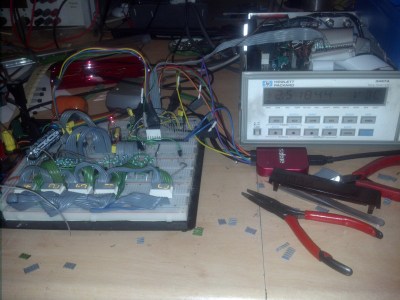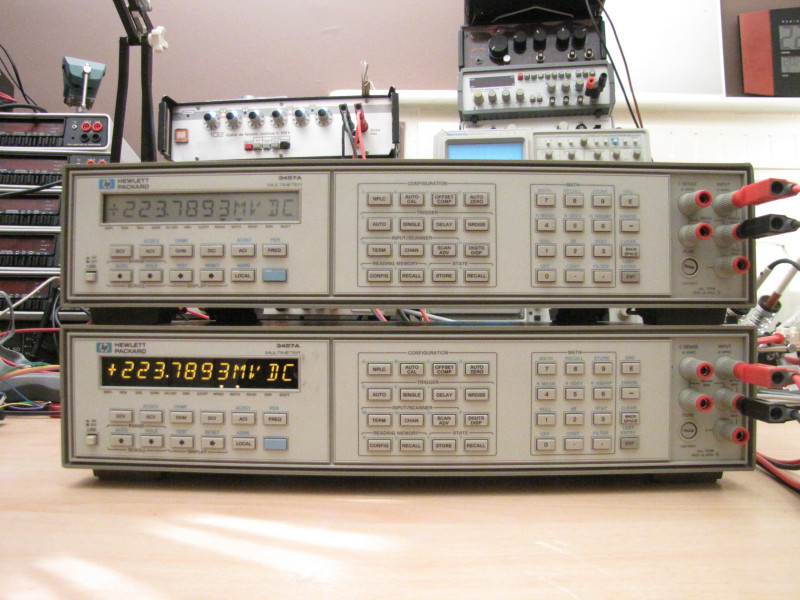Have you ever been so frustrated with a digital display that you wanted to rip the whole thing out and create a better one? That is exactly what [xi] did. Replacing their constantly used HP 3457A multimeter’s LCD display with a brighter LED one was a necessary project — and a stress reducing one at that.
While this digital multimeter is well-known for its reliability, its standard display is rather lacking. In fact, there are several mods already out there that simply add a backlight. However, as [xi] notes, LCD screens always have a certain angle where they still don’t quite show properly. So this hack reverses the LCD’s protocol and details the process of creating new LED display.

The issue of dim displays that comes with traditional digital multimeters is not a new one. One solution to this that we have seen before is a hack where someone decided to add a backlight onto their cheap multimeter. [Ken Kaarvik] got around the dimness altogether by giving his multimeter a wireless remote display of his choosing. It is interesting to see the different solutions that are made to the same nuisance. The first item on the agenda of [xi]’s hack was to successfully analyze the HP LCD protocol. With the aid of an ATmega32, the digits were decoded throughout the transmission frames.
Next on the list was to design a casing that would hold the LED display controlled by an ATmega162 with all of the corresponding parts sandwiched underneath. This was accomplished with three spiffy PCBs stacked on top of one another. After completed, a few discrete logic gates were added in the SPI hardware module when retrieving information from the HP to account for the 10-bit vs. 8-bit frames. But that was all the tweaking required!
This smooth build achieved an 80 Hz refresh rate that was faster than the original due to the increased speed of the CPU. The power consumption was a bit higher than the previous version, but this was to be expected with the exceptionally brighter display — and well worth it at that. What is your favorite multimeter display hack?
Thank you for the straightforward and beautiful hack, [xi].
















“What is your favorite multimeter display hack?”
This. This one is. I love the glowing yellow numbers.
I have an HP3456A at home. If it didn’t already have 7-segment LEDs for the display, I can totally understand why one might want to do this mod. Nice job on making good equipment even better and doing something HP should have done to begin with.
Well, at the time it came out, LEDs were considered passe’, and LCDs were the “next best thing”.
I have a 3478A at home and its far off to the side from the working part of my bench, I never really had an issue with it other than “wouldn’t it be nice if it had a vfd like the 34401” the update rate of the thing in 7 dec mode is a bigger nuisance IMO
anyway its a nice hack and it looks really good
Reading the full details the hack is even more impressive. Display hacks are always nice.
Interesting stuff and very nicely executed! This hack is a great improvement for usability and looks.
The way you word the article sounds like he just threw an off-the-shelf LCD into the enclosure with a little decoding in the atmega, but reading the actual post shows some beautiful hardware hacking that most wouldn’t even think of doing. Off-handedly mentioning that feat of craftsmanship and over-the-top detail as merely “spiffy” really downplays this stellar project.
Would love to have this in my Fluke…https://sites.google.com/site/kenselectronicsprojects/fluke8050a_display
That’s a HACK!
Great job!
A lot of the older Fluke 802x meters had LCD failures.
I got one of the last replacement LCDs they had for my 802(?) greater than 10 years ago.
On an device that can read down to 7.5 digits, you need to be very careful. It would be interesting to see if the changes in power consumption, heat, or electrical noise changed the calibration. You are not messing with a 3.5 digit HF DVM here.
I have one of these meters, it’s one of my favorite pieces of test equipment. That being said, I would LOVE to be able to do this mod to my meter. Unfortunately, I don’t possess the tools, education, or physical ability to do this. I really hope that he makes this into a kit.
Does the 34401 A have a similar display protocol (or any of the hp/agilent/keysight Power supplies eg E3633A) that would lend itself to a replacement of the aging vfds by a more modern solution?
“What is your favorite multimeter display hack?” you ask…
BRIIIIAAAAANNNNNN!!!!!!!! go make some clones of the aforementioned HP and add a logic analyzer and FFT to it.
My favorite multimeter hack is the unreleased Benchoff-O-meter 3457A IO-FFT Rev 1.0A.
There does need to be something to backup the Benchoff currency. ;-)
Would that be handheld or BENCH top?
B^)
That’s a good question…
If it were a bench-top then it’d be a Benchon!
But because it is a Benchoff… it isn’t allowed to be on the bench as it is to hence forth and Benchoff…
Thus requiring it to be portable… However, I’d not like the wrist strain using an entire size of a HP 3457A as a handheld… So it’d have to be on the bench….
Very impressive results.
I’m a little concerned about all the mods to the individual display modules (reliability, etc). Best to fabricate a few spares now (and store them inside the unit itself) for future replacements.
I understand there are several indicators *beneath* the digits (that are used to indicate various modes), but other than a decimal point, what are the items *between* the digits? Are they necessary?
“What is your favorite multimeter display hack?” – If we allow that it is not strictly hacking the display, but certainly hacking the meter and displaying the readings, then Kerry Wong’s adding serial output to DTM0660 based multimeters would be my favourite DMM hack.
https://hackaday.com/2016/04/02/hack-your-multimeter/
http://www.kerrywong.com/2016/03/19/hacking-dtm0660l-based-multimeters/
.. such a useful hack, that I then hacked QtDMM to work with the DTM0660.. thus allowing me to display (and log) the results on my laptop.
https://github.com/pingumacpenguin/QtDMM-DTM0660-Version
.. and for good measure, I also hacked up a “Blue Pill” STM32 board to hack the 24CXX eerom on DTM0660 based DMMs.
http://stm32duino.com/viewtopic.php?t=1296
https://github.com/pingumacpenguin/DTM0660-flasher-arduino-sketch
.. a hack inspired by a hack.
it would be possible to use this led display on HP6623A ?